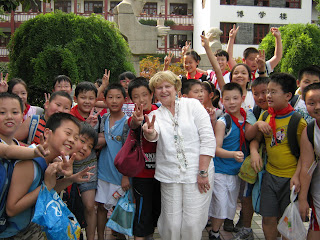
Cultures have differing notions of personal boundaries and property. Western ideas about plagiarism can be difficult for Chinese students to deal with. Memorization figures so prominently in their education system that they sometimes reproduce other people's work from memory, believing they're doing their own. Outright copying is not allowed in China, anymore than it is in ours, but in practice it is not sanctioned as severely. The notion of words and ideas as personal property is less well established there.
Learning cultural attitudes and practices is part of learning a language, so I spend a lot of time on plagiarism rules when I'm teaching in China. To a Western academic, the notion of ideas as property seems perfectly natural; but it's odd, when you think of it. Ideas are mobile. They morph, collide, and mutate, so it's hard to say where they came from or who they belong to.
I started to say that ideas move about like wind, but realized the statement has other connotations. Then again, if you attend the same type of meetings I do, comparing ideas with wind will not seem farfetched.





















































